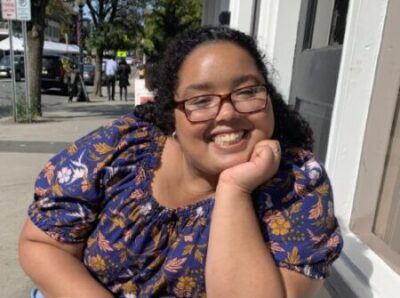Meet alumna Halee Robinson
Today, we’re talking with alumna Halee Robinson who graduated in 2019 with a double major in history and political science. She’s currently a fourth-year Ph.D. candidate in the Department of History at Princeton University, studying the carceral state and state violence following the Civil War.
 Q. Tell us about your research work at Vanderbilt, and why you chose that topic?
Q. Tell us about your research work at Vanderbilt, and why you chose that topic?
A. While I was at Vanderbilt, my research focused on the lives and experiences of enslaved women in antebellum Tennessee. In 2017, I started doing archival research under the mentorship of Dr. Brandon Byrd, associate professor of history.
I traced the life of an enslaved woman named Susanna Carter from her enslavement on Carnton and Belle Meade plantations to the decades after emancipation. This research influenced me to think critically about what the intimate lives and spaces of enslaved women could tell us about the gendered realities of slavery, resistance, and freedom.
I continued my focus on enslaved women but pivoted toward thinking about the space of the slave cabin and the concept of home. Enslaved people’s quarters were central places in their lives where they rested, resisted, and labored. Because plantations existed as spaces where the threat and reality of violence and violation was omnipresent, I explored how enslaved people, especially enslaved women, cultivated their homes as spaces they cherished and tried to protect. I argued that the space of the home was central to them as women and mothers and, in turn, shaped how enslaved women thought about their womanhood and motherhood. Oftentimes, these spaces were also essential to how Black folks understood and practiced resistance and freedom during and after slavery.
Q. What is your current dissertation subject?
A. I’m currently working on the histories of the carceral state and state violence following the Civil War. My dissertation, tentatively titled “The Texas Penal System, Community, and the Meanings of Freedom and Citizenship,” examines the burgeoning Texas penal system and its effects and consequences on the everyday lives of Texas residents and communities between 1865 and the early twentieth century. While my dissertation considers how the penal system affected poor white, Black, Mexican, and Tejano people, I mostly focus on its effects on poor Black Texas residents because they made up the majority of the incarcerated population. To explore this, I have relied mostly on state archival sources, including state legislative investigations into the prison system, pardon records, petitions, governors’ papers, and official prison records, and some other records like personal letters, photographs, and convict narratives.
My project hopes to illuminate how poor Black people encountered and challenged the white supremacist criminal legal system, experienced state penal systems, and navigated the policing and incarceration of their friends, family, and communities. It’s essential to understand that the penal system didn’t just affect those who it incarcerated. Instead, it affected the lives of a variety of people–those who were connected to prisoners as friends, family, and community members, those who had daily encounters with entities like law enforcement, and even those who lived in close physical proximity to carceral institutions. Focusing on Texas residents’ experiences with policing, courts, state punishment, and state violence, I argue that encounters with the penal system, especially if they were personal or community-driven, shaped how people understood and navigated freedom, citizenship, and the criminal legal system in the postbellum and Jim Crow South. With my research, I hope to continue the work of other scholars who have historicized the carceral state and the current crisis of mass incarceration.
Q. What are your future plans?
A. As for the future, the first future step is to finish the dissertation; that’s what I’m mostly focused on right now. After I earn my Ph.D., I’d really like to continue in academia as a professor. I have a deep passion for teaching and mentorship, and I think teaching at a university would allow me to do both of those things.
